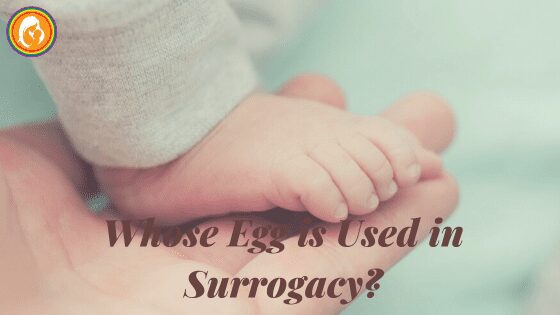Whose Egg is Used in Surrogacy?

Whose Eggs Are Used in Surrogacy?
Either the intended mother’s egg or egg donor’s egg is used in surrogacy based on the specific indication of infertility. Surrogacy is a complex and compassionate journey, often involving the intended parents, a surrogate mother, and the creation of a new life. An important question that arises is, “Whose eggs are used in surrogacy?” The answer depends on the type of surrogacy being pursued.
Key Takeaway
| – Surrogacy includes the use of the mother’s or donor’s egg. |
| – Donor eggs are often used when the intended mother is unable to provide herself. |
| – The choice depends on medical and personal factors. |
| – Legal agreements are important to clarify ownership of the egg. |
| – Understanding the process is important for anyone considering surrogacy. |
 Understanding the Role of Eggs in Surrogacy
Understanding the Role of Eggs in Surrogacy
Surrogacy is a unique and compassionate way for individuals or couples to fulfill their dream of parenthood. But one question that often comes up in discussions about surrogacy is, “Whose eggs are used in surrogacy?” Let’s dive into this intriguing topic and explore the different aspects.
Traditional Surrogacy
In traditional surrogacy, the surrogate mother uses her own eggs for pregnancy. These eggs are fertilized with sperm from either the intended father or a donor. As a result, the surrogate is both the biological mother and the gestational carrier of the baby.
This method was more common in the past but has become less popular due to the complex legal and emotional issues it can entail. So, in the case of traditional surrogacy, surrogate mother eggs are used. So, she is just a carrier but the baby’s genetic mother.
Gestational Surrogacy
In contrast, gestational surrogacy involves using the eggs of either the intended mother or an egg donor. The fertilized embryo is then implanted in the surrogate mother’s womb, carrying the pregnancy to term. In this situation, the surrogate mother is not genetically related to the child but plays an important role in carrying and caring for the baby until birth.
In this case, the egg donor for surrogacy can be a female partner or an egg donor.
It is important for intended parents and surrogates to understand these differences when undertaking a surrogacy journey. The choice of whose eggs to use depends on individual circumstances, preferences, and medical considerations.
Additional guidance for egg donor surrogacy:
Will My Baby Look Like Me If I Use an Egg Donor?
Infographic- How Does the IVF Egg Donor Process Work?
Egg Donation Process- The Definitive Guide for IVF Egg Donors
Can I use an Egg Donor and Sperm Donor for my Surrogacy Journey?
How Long Does the Egg Donation Process Take?
IVF with Egg Donation is Easy and Affordable
Egg Donation FAQs Answered
Egg Donation Requirements: Complete Guide
Whose Eggs Are Used in Surrogacy?
In surrogacy, the choice of whose egg to use depends on several factors, including medical and personal considerations. There are two main options:
- Mother’s Egg
In some cases, the intended mother can donate her own eggs. This is a common choice when the intended mother is physically capable of producing viable eggs. This allows for a genetic connection between the child and the intended mother.
- Donor Eggs
If the intended mother is unable to produce viable eggs due to medical reasons, a donor egg can be used. Donor eggs are usually provided by a carefully screened and selected egg donor. This option ensures pregnancy success and is a common solution for many surrogacy cases.
Factors Influencing the Choice of Whose Eggs to Use for the Surrogacy Journey.
The decision between using the intended mother’s egg or a donor egg is influenced by several factors:
- Medical condition: If the intended mother has medical conditions that affect her egg quality, a donor egg may be a safer option.
- Age: Since a woman’s age affects egg quality, older mothers can choose donor eggs.
- Genetic Connection: Some parents prioritize a genetic link between the child and the intended mother.
- Personal Preferences: Individual preferences and values play an important role in this decision.
The Legal Aspect of using an egg donor
The use of eggs in surrogacy raises important legal questions. Legal agreements are important to clarify egg ownership and parental rights. These agreements define who has legal rights to the child and what role the surrogate mother plays.
In the world of assisted reproductive technologies, the concept of surrogacy plays an important role in helping individuals and couples realize their dreams of parenthood. A surrogate mother, often carefully selected, plays an important role in this process. In many cases, the IVF process is used, in which an egg donor may also be involved, contributing to the creation of an embryo that is then implanted in the womb of the surrogate mother.
Legal guidelines and laws of surrogacy vary from one region to another, governing the entire surrogacy journey. These laws not only outline the responsibilities and rights of all parties involved but also address parental rights and the identity of the child at birth.
Surrogacy agreements, which are legally binding documents, are drafted to ensure that everyone’s expectations and responsibilities are clearly defined.
While the emotional and ethical aspects of surrogacy are important, it is also important to consider practical aspects, such as fertility treatments and surrogacy costs.
Fertility treatments can be complicated and expensive, which affects the overall cost associated with surrogacy. Understanding these different aspects is important for anyone considering or embarking on a surrogacy journey, as it allows for informed decisions and a smoother path to parenthood.
The use of an egg donor or not, is one of the most important questions that arise during infertility treatment. Intended parents want a baby who is biologically connected to them, but sometimes for medical or age-related reasons, they have to consider an egg donor.
Conclusion
In the world of surrogacy, the question is whose egg is used. In fact, this is one of the biggest dilemmas for parents-to-be.
It is a decision that involves medical, emotional, and legal aspects. Understanding these factors is important for anyone considering surrogacy as a path to parenthood. Whether it is a mother’s egg or a donor egg, the ultimate goal remains the same – to welcome a new life into a loving family.
FAQs for Whose Eggs Are Used in Surrogacy?
What is the difference between traditional and gestational surrogacy?
- Traditional surrogacy involves the surrogate mother using her own eggs, while gestational surrogacy uses eggs from the intended mother or an egg donor.
Is the surrogate mother genetically related to the child in gestational surrogacy?
- In gestational surrogacy, the surrogate mother is not genetically related to the child. The child is biologically related to the intended parents or the egg donor.
Can intended parents choose to use an egg donor in surrogacy?
- Yes, intended parents may choose to use an egg donor in surrogacy, especially in gestational surrogacy when the intended mother is unable to provide her own eggs.
How is the egg retrieval procedure done for gestational surrogacy?
- The egg retrieval procedure in gestational surrogacy involves the intended mother or egg donor undergoing IVF treatment to stimulate egg production. The eggs are retrieved and fertilized with sperm in a lab before being transferred to the surrogate’s uterus.
Are there any legal aspects of whose eggs are used in surrogacy?
- Yes, there are legal aspects to consider in surrogacy, including agreements that determine whose eggs will be used and the rights and responsibilities of all parties involved. Legal guidance is essential in surrogacy arrangements.
Reference used:
ASRM- Surrogacy
About the Author:
Neelam Chhagani, MA (Counselling Psychology), PGD (Mental Health), and Holistic Infertility and Third-Party Reproduction Consultant.
Member of the European Fertility Society, Best Surrogacy Blogger of 2020, with 200 dedicated blogs and leading contributor on Quora for Surrogacy.
Highly respected, authoritative and trusted professional with 13 years of experience in international surrogacy. Advocate for Secure, Legal, and Affordable International Surrogacy.
Learn more:
https://www.ivfconceptions.com/neelam-chhagani-surrogacy-consultant/
https://www.linkedin.com/in/neelam-chhagani-92892229/
https://www.quora.com/profile/Neelam-Chhagani

 Understanding the Role of Eggs in Surrogacy
Understanding the Role of Eggs in Surrogacy



